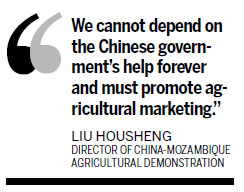A land of promise must learn to grow without China's aid
By Yao Jing (China Daily) Updated: 2014-02-11 07:17With ample land sources, Mozambique is prepared for a boom in agriculture and animal husbandry. "But we are proceeding a bit slowly in the two sectors," Vaquina said.

In his Portuguese-style government house by the Indian Ocean, Vaquina said his country was expecting increased partnership with China, both between governments and businesses.
Two-way trade between China and Mozambique totaled $1.19 billion in the first nine months of 2013, up 21.9 percent from the same period in 2012.
China's outward direct investment in non-financial sectors in the country accumulated to $340 million by the end of 2012. Private companies played a main role, with investment in mineral resource exploitation and agriculture, according to China's Ministry of Commerce.
Mirroring the country's recent average year-on-year economic increase of 7.2 percent, it seems to be a land of promise. However, more than half of the government budget relies on foreign aid, while the potential of the country's agriculture is also awaiting further development.
On the other side, in what it refers to as the terms of public-spirited foreign aid, China has launched more than 10 agricultural demonstration centers in Africa. However, these centers have not figured out an appropriate way to balance the public function of the centers and the necessary market efficiency for the sustainable development of the centers.
Liu, an agricultural expert, is selecting and transporting rice, corn, and cotton seed from China to Mozambique and cultivating them in experimental plots.
"The soil is very rich here. We don't need any pesticides or many cultivation techniques. The productivity of rice is 800 kilograms for each acre (0.4 hectare)," said Liu.
Local producers' capacity is traditionally 100 kilograms of corn from each acre, but Liu has succeeded in increasing it to 150 kilograms on equivalent land.
"We hope to solve the country's trade deficit in rice and corn through industrial development of grain, while helping them improve food safety," Liu said.
In addition to expanding research and development, the center is also promoting a training program to expand the range of aid around the country.
In the training room on the first floor of a building, 16 agricultural technicians are attending classes.
"Fourteen other students will participate in this training, which lasts one month, but they are still on their way," said Liu.
- NHTSA says finds no 'defect trend' in Tesla Model S sedans
- WTO rare earth ruling is unfair
- Amway says 2014 China sales may grow 8%
- President Xi in Europe: Forging deals, boosting business
- CNOOC releases 2013 sustainability report
- Local production by Chery Jaguar Land Rover this year
- Car lovers test their need for speed in BMW Mission 3
- China stocks close mixed Monday

















